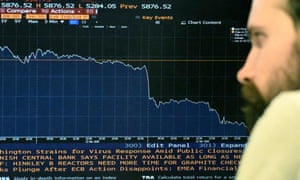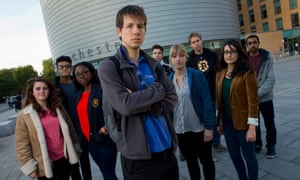‘Framing the future in terms of probabilities gives us the illusion of knowledge and control, which is extraordinarily tempting, but it’s all hubris.’ Photograph: Daniel Sorabji/AFP via Getty Images
Even before the pandemic came along, the world economy faced a set of deepening crises: a climate emergency, extreme inequality and huge disruption to the world of work, with robots and AI systems replacing humans.
Conventional economic theories have had little to offer. On the contrary, they have acted like a cage around our thinking, vetoing a range of progressive policy ideas as unaffordable, counter-productive, incompatible with free markets, and so on. Worse than that, economics has led us, in a subtle, insidious way, to internalise a set of values and ways of seeing the world that prevents us even imagining various forms of radical change.
Since economic orthodoxy is so completely embedded in our thinking, escape from it demands more than a short-term spending splurge to prevent immediate economic collapse, vital though that is. We must dig deeper to uncover the economic roots of the mess we’re in. Putting it more positively, what do we want from post-coronavirus economics?
Mainstream economics has taught us that the only rational way to deal with an uncertain future is to quantify it, by assigning a probability to every possibility. But even with the best expertise in the world, our knowledge often falls far short. Frequently we struggle to predict which outcomes are more likely. Worse still, there may be outcomes we haven’t even considered, futures that no one had imagined, as the pandemic has so vividly shown.
Framing the future in terms of probabilities gives us the illusion of knowledge and control, which is extraordinarily tempting, but it’s all hubris. In the run-up to the 2007 financial crisis, bankers were proud of their models. Then that August, the Goldman Sachs chief financial officer admitted the bank had spotted huge price moves in some financial markets, several times in one week. Yet according to its models, each of these moves was supposed to be less likely than winning the UK national lottery jackpot 21 times in a row. World events sometimes demand humility.
There are clear lessons here for how to address the climate emergency: rather than focusing on the average climate impacts predicted by mathematical models that depend on probabilistic knowledge that is highly unreliable, we must think seriously about worst-case scenarios, and take steps to avoid them. Yet economic orthodoxy pushes us away from precautionary action. If mainstream economics has a single overarching objective or principle, it is efficiency.
Efficiency means getting the most “bang for your buck”, the most benefit for every pound spent. Any other course of action is wasteful, surely? But eliminating waste implies eliminating excess capacity, and we now see the consequences of that in health systems worldwide. Our obsession with efficiency, if it means failing to plan for a pandemic or a climate emergency, will cost lives.
Our priority should be resilience, not efficiency. We need to build resilient systems and economies that are explicitly designed to withstand worst-case scenarios – and have a fighting chance of coping with unforeseen disasters too.
Ultimately the problem with economic orthodoxy lies in how it frames our values and priorities. Decisions must always be about trade-offs – the weighing up of costs against benefits, ideally measured through prices in markets. If we take our ignorance about the future seriously, this cost-benefit calculus should not even get started. Because costs outweighing benefits is the oldest excuse for not taking precautions – and is a recipe for disaster when the benefits, or the costs of inaction, are vastly undervalued.
Cost-benefit thinking also leads us to assume that all values can be expressed in monetary terms. Many politicians and business leaders fixate on statements such as “a 2°C rise in average global temperature will reduce GDP by up to 2%”, as though a fall in GDP measures the true costs of the climate emergency.
In practice, this thinking means that the value of everything is measured by how much people offer to pay for it. Since the rich can always pay more than the poor, priorities get skewed towards the desires of the rich, away from the needs of the poor. So more money is spent on R&D for anti-wrinkle creams than for malaria treatments. Big Pharma has been relatively uninterested in developing vaccines, because a vaccination programme only works if the poor get vaccinated too, which limits the price manufacturers can charge.
We might seem to be beyond that now: the world has woken up, and rich countries will spend “whatever it takes” to tackle the pandemic. But Covid 19 vaccine research – and countless other fields of medical research with the potential to save as many lives in the long-term – needs continuous, reliable funding over many years. Once the market sees better profit elsewhere, funding will be cut, and the researchers will retire or move on, their experience lost.
Economic orthodoxy supports the narrative that this pandemic is a unique disaster no one could have prepared for, and with no wider lessons for economics and politics. This story suits some of the world’s billionaires, but it’s not true. There is an alternative: the pandemic provides further evidence that to tackle the climate emergency, inequality and any emerging crises, we must re-think our economics from the bottom up.
Even before the pandemic came along, the world economy faced a set of deepening crises: a climate emergency, extreme inequality and huge disruption to the world of work, with robots and AI systems replacing humans.
Conventional economic theories have had little to offer. On the contrary, they have acted like a cage around our thinking, vetoing a range of progressive policy ideas as unaffordable, counter-productive, incompatible with free markets, and so on. Worse than that, economics has led us, in a subtle, insidious way, to internalise a set of values and ways of seeing the world that prevents us even imagining various forms of radical change.
Since economic orthodoxy is so completely embedded in our thinking, escape from it demands more than a short-term spending splurge to prevent immediate economic collapse, vital though that is. We must dig deeper to uncover the economic roots of the mess we’re in. Putting it more positively, what do we want from post-coronavirus economics?
Mainstream economics has taught us that the only rational way to deal with an uncertain future is to quantify it, by assigning a probability to every possibility. But even with the best expertise in the world, our knowledge often falls far short. Frequently we struggle to predict which outcomes are more likely. Worse still, there may be outcomes we haven’t even considered, futures that no one had imagined, as the pandemic has so vividly shown.
Framing the future in terms of probabilities gives us the illusion of knowledge and control, which is extraordinarily tempting, but it’s all hubris. In the run-up to the 2007 financial crisis, bankers were proud of their models. Then that August, the Goldman Sachs chief financial officer admitted the bank had spotted huge price moves in some financial markets, several times in one week. Yet according to its models, each of these moves was supposed to be less likely than winning the UK national lottery jackpot 21 times in a row. World events sometimes demand humility.
There are clear lessons here for how to address the climate emergency: rather than focusing on the average climate impacts predicted by mathematical models that depend on probabilistic knowledge that is highly unreliable, we must think seriously about worst-case scenarios, and take steps to avoid them. Yet economic orthodoxy pushes us away from precautionary action. If mainstream economics has a single overarching objective or principle, it is efficiency.
Efficiency means getting the most “bang for your buck”, the most benefit for every pound spent. Any other course of action is wasteful, surely? But eliminating waste implies eliminating excess capacity, and we now see the consequences of that in health systems worldwide. Our obsession with efficiency, if it means failing to plan for a pandemic or a climate emergency, will cost lives.
Our priority should be resilience, not efficiency. We need to build resilient systems and economies that are explicitly designed to withstand worst-case scenarios – and have a fighting chance of coping with unforeseen disasters too.
Ultimately the problem with economic orthodoxy lies in how it frames our values and priorities. Decisions must always be about trade-offs – the weighing up of costs against benefits, ideally measured through prices in markets. If we take our ignorance about the future seriously, this cost-benefit calculus should not even get started. Because costs outweighing benefits is the oldest excuse for not taking precautions – and is a recipe for disaster when the benefits, or the costs of inaction, are vastly undervalued.
Cost-benefit thinking also leads us to assume that all values can be expressed in monetary terms. Many politicians and business leaders fixate on statements such as “a 2°C rise in average global temperature will reduce GDP by up to 2%”, as though a fall in GDP measures the true costs of the climate emergency.
In practice, this thinking means that the value of everything is measured by how much people offer to pay for it. Since the rich can always pay more than the poor, priorities get skewed towards the desires of the rich, away from the needs of the poor. So more money is spent on R&D for anti-wrinkle creams than for malaria treatments. Big Pharma has been relatively uninterested in developing vaccines, because a vaccination programme only works if the poor get vaccinated too, which limits the price manufacturers can charge.
We might seem to be beyond that now: the world has woken up, and rich countries will spend “whatever it takes” to tackle the pandemic. But Covid 19 vaccine research – and countless other fields of medical research with the potential to save as many lives in the long-term – needs continuous, reliable funding over many years. Once the market sees better profit elsewhere, funding will be cut, and the researchers will retire or move on, their experience lost.
Economic orthodoxy supports the narrative that this pandemic is a unique disaster no one could have prepared for, and with no wider lessons for economics and politics. This story suits some of the world’s billionaires, but it’s not true. There is an alternative: the pandemic provides further evidence that to tackle the climate emergency, inequality and any emerging crises, we must re-think our economics from the bottom up.

